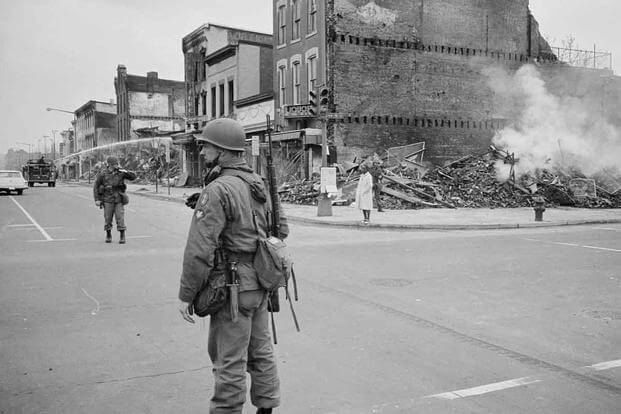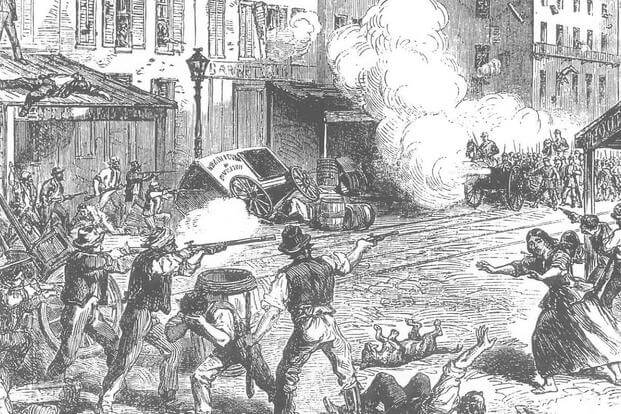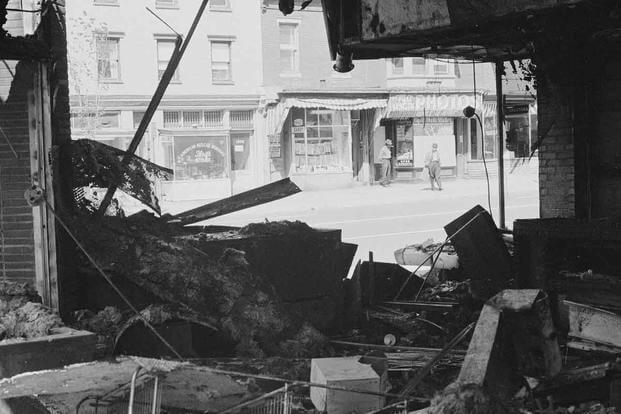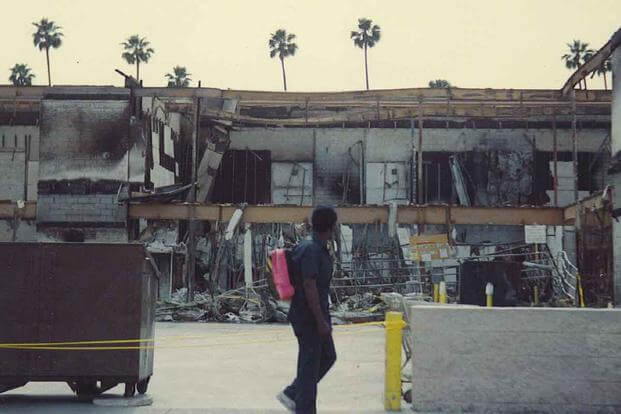If something like these examples that got so out of hand so quickly can be prevented, then I sure wish these people in charge would
get together and do something instead of fighting back and forth and standing firm because they hate each other and just
protect the people they say they care about so much...... clean up your cities then on your own or admit to needing help and make it a team effort.
Instead if we (outside of the areas involved now) wouldn't take sides and fuel the flames of either side, then maybe tempers would die off and some sane talk will happen.
If they have an audience; they hunger for encore. I lived near the Watts riots and honey, it was a scary thing and spread fast and that wasn't even the bigger ones.
6 Times the Military Was Used for Riot Control in the US
A soldier standing guard on the corner of 7th & N Street NW in Washington D.C. with the ruins of buildings that were destroyed during the riots that followed the assassination of Martin Luther King, Jr. (Warren K. Leffler/Library of Congress)
Military.com | By
Blake Stilwell
Updated June 10, 2025 at 9:38am ET

Marines and additional National Guard troops were headed to Los Angeles this week on President Donald Trump’s orders in response to protests over immigration raids.
The authorization came amid mostly peaceful protests in the city on Monday.
California officials sued Trump on Monday to roll back the administration's National Guard deployment, saying the president trampled over the state’s sovereignty. Local officials and Gov. Gavin Newsom don’t want the military presence and the police chief has said it creates logistical challenges for safely handling protests.
Read More: Trump Deploys Hundreds of Marines to LA in Growing Military Response to Immigration Raid Protests
How federal troops are used in domestic law enforcement is governed by a pair of laws -- the Posse Comitatus Act of 1878 and the Insurrection Act of 1807. Those dictate circumstances in which federal troops can be deployed on American soil, including natural disaster, terrorist attack, epidemic or domestic violence.
When it comes to curbing civil unrest, the military has been called out on multiple occasions -- and it wasn’t just the National Guard, either. Here are a few examples.
1863: The New York City Draft Riots
The Civil War was the first time in American history that the United States had to forcibly enlist its citizens to fight a war. Unsurprisingly, people who have no interest in fighting with rifles and bayonets aren't keen on being forced to do it. To make matters worse, wealthy Americans could avoid the draft by paying $300, the equivalent of almost $7,000 in 2020 dollars.
The New York Draft Riots are still the largest civil disturbance in American history. In order to put them down (and maybe save half of Manhattan), the governor had to call not only the New York militia, he had to call in U.S. Marines.
The NYC Draft Riots. (National Archives and Records Administration)
The violence got so bad, President Lincoln also sent battle-hardened veterans -- who just finished fighting at Gettysburg -- to New York to restore and maintain order.
1932: Disbanding the "Bonus Army"
Though not as destructive or deadly as the NYC Draft Riots, the 1932 Bonus Army attack was notable for the use of federal military troops to clear out a bunch of veterans looking for help from the government -- help that was promised to them anyway.
In the years following the 1929 stock market crash, the situation for struggling World War I veterans quickly went from bad to worse. Congress promised them a cash payment of up to $1 for every day they were in active service, to a maximum of $500. That's a cool $9,300 in 2020 dollars, more than enough to survive the Great Depression.
For most vets, that money was to be paid over the span of years, but with the Depression in full swing, everyone needed cash right then. The veterans formed an
activist group called the "Bonus Army" to go to Washington and advocate for the pay,
setting up camp on Capitol Hill.
President Herbert
Hoover's attorney general ordered the police to remove them, which did not go as planned. Hoover soon got wind of the incident and ordered General Douglas MacArthur and tanks from the 3rd Cavalry Regiment to do the job. The Army shot tear gas and marched on the Bonus Army with fixed bayonets. As the vets retreated from Capitol Hill, the U.S. Army burned their encampment.
(Kinderwood Archive)
1967: Detroit's 12th Street Riot
The second largest riot since the 1863 Draft Riot in New York happened in Detroit in 1967 -- and was a harbinger for the tumultuous years to come in the United States.
In that year, almost 160 race riots broke out across the United States, earning the nickname the "Long, Hot Summer of 1967." None of the uprisings were more destructive than in Detroit, where what started as a
police raid on an illegal after-hours bar turned into one of the country's most violent and destructive riots ever.
For five days, the citizens of Detroit ran wild through the streets. It was one so rampant that then-Governor George Romney (yes, Mitt Romney's dad) chose to call in the Michigan
National Guard. When even that didn't work, President Lyndon Johnson called in the 82d and 101st Airborne.
In the wake of the riot, 43 were dead and more than 2,000 buildings were destroyed.
1967: Newark Riots
This is another significant disturbance of the 1967 "Long, Hot Summer," particularly due to the level of destruction the riots caused the city of Newark -- a level from which the city has never fully recovered.
As middle-class white Americans left urban areas after WWII, Black Americans still faced widespread racism and discrimination in those cities. Finding a decent job and a place to live became more and more difficult, even though those opportunities existed.
The frustration of Black Newark boiled over as the city descended into poverty. City politicians and police mostly remained white. The frustration came to a head when a Black cab driver was beaten unconscious and dragged to a police station by white officers for passing a double-parked police vehicle. There, he was charged with assaulting the police officers. Rumors spread that he was killed in police custody. He wasn't -- but he was badly beaten.
What began as a protest against police brutality soon turned into widespread rioting and looting. Even after the National Guard was deployed, the violence continued, causing $10 million dollars in damages ($77.6 million today) and killing 26 with hundreds injured. Almost 40 of the injured were from the New Jersey National Guard.
1968: Dr. Martin Luther King, Jr. Murdered
On Apr. 4, 1968, Dr. Martin Luther King, Jr was shot and killed outside of his Memphis, Tennessee motel room. As word of the killing spread in cities across the United States,
riots began to break out. Cities like Baltimore, Chicago, Nashville, New York, Raleigh, North Carolina and Washington erupted in violence.
Photograph shows the ruins of a store in Washington, D.C., that was destroyed during the riots that followed the assassination of Martin Luther King, Jr. (Warren K. Leffler/Library of Congress)
Everywhere, it seemed thousands of buildings were destroyed, hundreds of people were killed and thousands more arrested. In response, mayors throughout the country called in their respective national guardsmen to restore order in the streets. Restoring the rule of law in the nation's capital required more than 13,600 armed soldiers, the largest military occupation of a city since the Civil War.
1992: Los Angeles Riots
People responding to police brutality with protest again sparked a riot in 1992. Four LAPD officers were acquitted of using excessive force in the beating of motorist Rodney King after being stopped in traffic.
When the verdict was announced, Los Angeles exploded in a riot that covered 32 square miles.
The aftermath of the Los Angeles riots. (Mick Taylor)
In the end, it would take every Los Angeles law enforcement officer, 10,000 California National Guard troops and hundreds of United States Marines to restore order and begin putting Los Angeles back together again.
The Associated Press contributed to this report.





